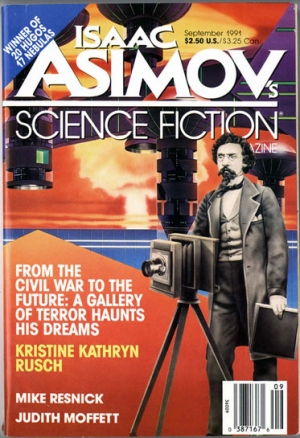Birthday Reviews: Judith Moffett’s “Chickasaw Slave”

Judith Moffett was born on August 30, 1942.
Moffett’s story “Surviving” won the Theodore Sturgeon Memorial Award in 1987. The following year, she won the John W. Campbell Memorial Award for Best New Writer. She has been nominated for the James Tiptree Jr. Memorial Award and the Hugo Award one time each and has been nominated for the Nebula Award three times. In addition to writing science fiction, Moffett has also published poetry.
Although written for the anthology Alternate Presidents, “Chickasaw Slave” was first published in the September 1991 issue of Isaac Asimov’s Science Fiction Magazine, edited by Gardner Dozois. The story appeared in Alternate Presidents, edited by Mike Resnick, the following February. It has not been reprinted since.
“Chickasaw Slave” is set in a world in which Andrew Jackson was not nominated to run for President in 1928. The nomination and Presidency instead went to then-first term Congressman Davy Crockett. In this timeline, the Civil War erupted more than a decade earlier and in 1852, on the eve of the final battle of the war that led to Confederate independence, Levi Colbert, wrote a letter to his fiancée in case he died in which he told a story of his own interaction with President Crockett years earlier.
Because Crockett is sharing information about his own family with his fiancée, it gives Moffett the perfect chance to provide the reader with some of the information needed about this alternative timeline. Unfortunately, a lot of the information given by Levi to Rachel concerns issues that she would have known about, making the first half of the story a datadump, although at the same time, nowhere does Moffett explain how Crockett’s election caused an earlier Civil War, information that is not particularly relevant to her story.
Her story does detail how a thirteen year old Levi helped a similarly aged slave, Watty, escape. Watty, who, like Levi, was part Chicaksaw, was treated as a member of the family and there was absolutely no thought of him as a slave until Levi’s father accidentally lost Watty in a card game to another citizen. Given permission to go fishing on their last day together, Levi decides the two should plead Watty’s case to President Crockett, who is visiting his Tennessee home nearby.